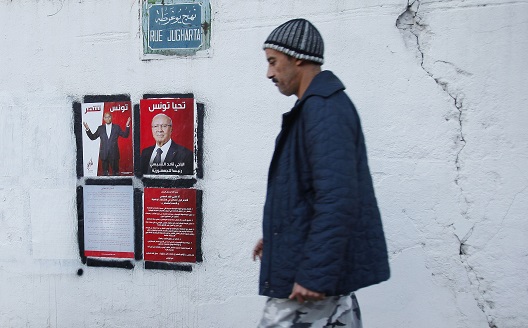 With no candidate having won a majority in the first round of presidential elections held last month, Tunisia will hold a run-off on December 21 between frontrunners Beji Caid Essebsi, leader of Nidaa Tounes, and interim President Mohamed Moncef Marzouki. Both political figures face legitimate criticisms in their own right and voters will face a hard choice as they cast their ballots in an attempt to elect the best person to lead Tunisia into the post-revolutionary phase.
With no candidate having won a majority in the first round of presidential elections held last month, Tunisia will hold a run-off on December 21 between frontrunners Beji Caid Essebsi, leader of Nidaa Tounes, and interim President Mohamed Moncef Marzouki. Both political figures face legitimate criticisms in their own right and voters will face a hard choice as they cast their ballots in an attempt to elect the best person to lead Tunisia into the post-revolutionary phase.
Marzouki is criticized for his failures in working with the Troika (the interim coalition between the Islamist Ennahda party and two other secular parties before the national dialogue last year) to enhance the economic, social, and security situation of the country. In this context, Essebsi’s campaign has used terrorism, coincidentally on the rise since Marzouki’s interim presidency and questioning his tolerance of Salafis and violent groups as the reason behind terrorist phenomenon. Marzouki is also accused of taking advantage of his current position as president of the republic to reinforce his reelection campaign.
Essebsi and his party, Nidaa Tounes, which dominates the recently elected parliament and will eventually lead the next government, have been trying to warn voters about the risks of Marzouki’s election: mainly that of political instability and conflicts between the president of the republic and prime minister, in addition to that between the president and the parliament. Essebsi’s campaign has stressed the need for harmony between these institutions and respect the balance of powers outlined in the new constitution, especially in the fields of foreign policy and national security and for the passage of new laws. Marzouki has responded to his rivals, asserting that, while in office, he has never disturbed the government’s activities and would guarantee the balance of power within the executive while protecting the state’s interests, allowing it to function normally.
Respected for his humanitarian work and after two years in the Troika coalition, Marzouki expected strong support from Ennahda party in the second round. However, after extensive debate in its Shura Council, Ennahda announced it would not officially endorse any one particular candidate. Disappointed and in disagreement about this decision, Hammadi Jbali, former prime minister and former general secretary of Ennahda, left the party. With this stance, Ennahda appears to prioritize appeasement with Nidaa Tounes, while believing that its members will vote for Marzouki.
Essebsi enjoys more support from the other parties, in particular the Free Patriotic Union and Afek Tounes, two big parties in the new parliament with the aim of aligning themselves with the leading Nidaa Tounes and thereby potentially securing their stake in the formation of the next government. The leftist Popular Front decided not to officially endorse Essebsi, even though the party is totally against Marzouki’s election.
In this context, eighty-eight-year-old Essebsi presents himself as the leader who has the charisma, experience, and wisdom required to run the country, in contrast to the humanitarians and Islamists who spent the past decades in exile or in jail. The slogan best associated with his campaign refers to returning prestige to the state.
Nonetheless, Essebsi faces criticism on two fronts: The first pertains to his age, with many questioning whether Essebsi has the energy to continue three more years in this important post. Second, with Essebsi having served in pre-revolutionary administrations and with former regime figures part of Nidaa Tounes’ ranks, there are concerns that Essebsi might open the door to ex-regime officials occupying prominent official positions, risking a return to corrupt old practices.
Essebsi argues that having a wise, older president at the helm is better than a young and potentially irresponsible one and has tried to assure citizens that he would not make the mistakes that someone of less experience might. Regarding concerns about the return of the old regime, he promises to respect the constitution and is confident in the mechanisms meant to prevent the return to dictatorship, pointing to the president’s limited prerogatives.
Many factors augment Essebsi’s chances. Few observers have noted the critical role of media and social networks (Facebook and Twitter) on the campaign climate. In fact, mainstream private television and radio channels criticize Marzouki for almost all of the problems facing Tunisia. Some channels invite Essebsi for long interviews, without asking tough or sensitive questions, helping to reinforce the positive image Essebsi is trying to project. The national television channel has maintained a level of neutrality unlike other networks. Demographic factors are also important, since northern and central cities that mainly support Essebsi are more populated than the south, where Marzouki has large popularity.
Overall, a Tunisian preoccupation with security may propel Essebsi to the presidency when voters cast their ballot on December 21. In the days leading up to the election, it appears that fewer Tunisians worry about avoiding Nidaa Tounes dominance and what the Marzouki camp has characterized as a threat to the precious gains of the revolution.
Naim Ameur is a political and economic analyst based in Tunis. He specializes in North Africa, with a focus on Tunisian and Libyan affairs.
Image: A man walks past election posters of presidential candidates in Tunis December 16, 2014. Tunisia will hold the run-off of its first democratic presidential election on December 21, between incumbent Moncef Marzouki and Beji Caid Essebsi, veteran leader of secularist party Nidaa Tounes, electoral authorities said last week. REUTERS/Zoubeir Souissi
